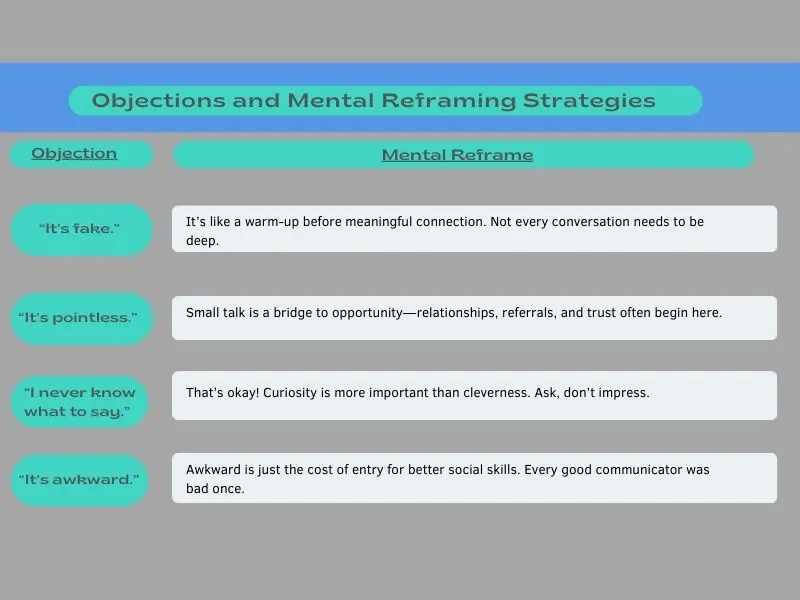Many young adults, professionals, and older adults alike find themselves saying, “I never get a chance to practice small talk anymore.” With more of our lives happening through screens and on-demand services, casual conversation is happening less and less. Remote work, online ordering, and digital-first interactions have chipped away at the once-ordinary moments of everyday connection.
Small talk can feel especially tricky for older adults who may be more set in their ways or hesitant to engage with others from different generations. And for younger professionals, lack of regular interaction can make small talk feel intimidating or unnatural.
But small talk skills still matter. It’s the starting point of relationships, a signal of friendliness, and often the bridge between stranger and teammate, acquaintance and friend. In this post, we’ll demystify small talk, explore why it feels harder these days, and offer ways to rebuild this essential skill.

What is Small Talk, Really?
Small talk is short, low-pressure conversation that helps people feel more comfortable with each other. It doesn’t have to be deep or profound—it just needs to be human.
Unlike scripted greetings or surface-level questions, good small talk invites engagement. Here are some examples that encourage real answers:
- “What kind of projects are you working on lately?”
- “How did you get into your field?”
- “What’s something you’re looking forward to this week?”
- “What’s been the highlight of your day so far?”
- “This weather’s wild, huh—do you prefer cold or warm days?”
These types of questions leave space for stories and shared experiences—exactly what makes small talk work. And in a world where someone can have 50,000 followers online but no close friends, real-time conversation is more valuable than ever.
Why Small Talk Feels Like a Dying Art
Small talk isn’t dying because people don’t care. It’s fading because the opportunities to practice are disappearing.
We live in a digital-first world:
- Self-checkout lanes replace friendly cashier banter.
- We order coffee and meals through apps without saying a word.
- Texts, GIFs, and emojis have replaced spontaneous chats.
On top of that, modern work culture prizes efficiency. Many workplaces jump right into tasks, leaving little space for informal connection, which can hinder relationship-building. As noted in a Forbes article, small talk is crucial in building professional rapport, trust, and even job success.
Objections & Mental Reframing
Many people have strong feelings about small talk. Let’s look at common objections and ways to reframe them:

Reframe your mindset:
“This is uncomfortable” → “This is a skill I’m building.”
“I’m not good at this” → “I’m learning to get better.”
Small Talk Strategies to Keep in Mind
Building effective small talk isn’t just about what you say—it’s about how you approach the moment. Here’s how to shift your mindset and strengthen your technique:
- Use F.O.R.D. topics: Family, Occupation, Recreation, and Dreams. These areas tend to be personal enough to create connection but broad enough to feel safe and approachable.
- Ask open-ended questions: Avoid yes/no questions that shut down the flow. Instead, use “what” or “how” questions that invite someone to share their perspective.
- Listen for hooks: Pay attention to anything they mention that stands out—a recent trip, a hobby, an upcoming event. Use these as jumping-off points to deepen the conversation: “You said you’re getting into photography—what do you like to shoot?”
- Match their tone and energy: Mirroring someone’s energy level, pace, or tone helps build rapport naturally. If they’re reserved, take it down a notch. If they’re animated, lean into it.
- Don’t fear pauses: A bit of silence doesn’t mean failure. It can be a moment to reflect, regroup, or give the other person space to continue. Breathe and don’t rush to fill every second.
- Lead with curiosity: You don’t need to be witty—just genuinely interested. Curiosity is more powerful than charisma in most conversations.
Small talk is not just about chit-chat—it’s an essential social skill that fosters psychological well-being. According to Psychology Today, engaging in casual conversation can help reduce stress and increase feelings of connection, making it a valuable practice in both personal and professional contexts.
If you’re looking for more help with your foundational communication tools—like how to pause, breathe, and sound confident—explore our Foundational Speaking Skills Program.
Functional Ways to Practice Small Talk
You don’t need a networking event or conference to practice small talk. Here are some easy, everyday ways to build your skill:
- Start small:
- Greet your delivery person with a question like, “How’s your day going?”
- Ask your coworker, “What’s been the best part of your week so far?”
- Try daily micro-goals:
- Compliment someone genuinely.
- Ask a stranger about their book, pet, or outfit.
- Pick up the phone and call someone instead of texting—it can help you become more comfortable with real-time interaction.
- Join a group with similar hobbies:
- Whether it’s a local book club, hiking group, or online gaming community, having shared interests gives you built-in material for conversation.
- Whether it’s a local book club, hiking group, or online gaming community, having shared interests gives you built-in material for conversation.
- Simulate situations:
- Practice aloud what you’d say if someone joined you on the elevator.
- Record yourself and play it back to hear your tone and flow.
- Look for low-pressure environments:
- Waiting rooms, shared elevators, office kitchen chats, or commenting in casual Slack channels.
If you’re ready to take your small talk from casual to career-boosting, check out our Networking Powerhouse Program, designed to help professionals build real confidence and connection through conversation.
Final Thoughts: Why Small Talk Still Matters
Small talk has big value.
In professional life, it builds rapport and trust. Whether you’re interviewing for a job, onboarding a new teammate, or pitching to a client, small talk is often what makes people like and trust you.
It helps:
- Create psychological safety at work.
- Open doors to unlisted opportunities.
- Strengthen your leadership presence.
- Make lasting first impressions.
- Reduce the risk of isolation for older adults, which has been shown in studies to be as damaging to health as smoking 10 cigarettes a day.
You don’t need to become an extrovert. You just need to practice.
Small talk is like a handshake for your voice. Learn to do it well, and doors start to open.
Want help developing your communication confidence? Corporate Speech Matter Expert can help you build the skills to connect—from casual conversations to career-changing presentations. Reach out for a free consultation today!
